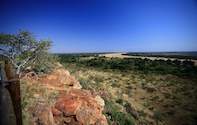
What effect do waterholes have on the surrounding vegetation? How does the spacing of artificial waterpoints affect the bush in the long-term? How does the bush recover if a waterhole is closed? Do areas of the bush where there are more closely spaced waterholes take longer to return to their original state if the waterpoints are removed?
These are some of the questions that PhD student Helen Farmer will be looking at over the next few years as she carries out research in private protected areas alongside the Kruger National Park, Kruger itself, and the adjoining Limpopo National Park in Mozambique.
Kruger has a number of artificial waterpoints, although many of the boreholes have been closed over the years, and views its waterpoints as a method of conserving biodiversity for future generations.The Limpopo National Park's management strategy does not include creating any artificial waterpoints in future, and does not have a past history of waterpoint creation. This provides a gradient of management intensity from west to east, and results from the study can help provide protected area managers with a better idea of how to manage artificial water provision to achieve their conservation goals.
Helen's work will look intensely at piospheres. A piosphere is the area around a source of water (or a feeding trough, or some other attraction) that is affected by the higher density of animals that come down to drink. The impact made by the animals on the vegetation and soils is most intense closest to the waterhole, and decreases with distance away from the water.Using both waterholes that are active and that have been closed, Helen will be able to study their piospheres and discover how the ecosystem copes with artificial water in different landscape types, and which landscape types and waterpoint densities are the most resilient.
Read more about Kruger Park Eco-system, Wildlife and Vegetation

